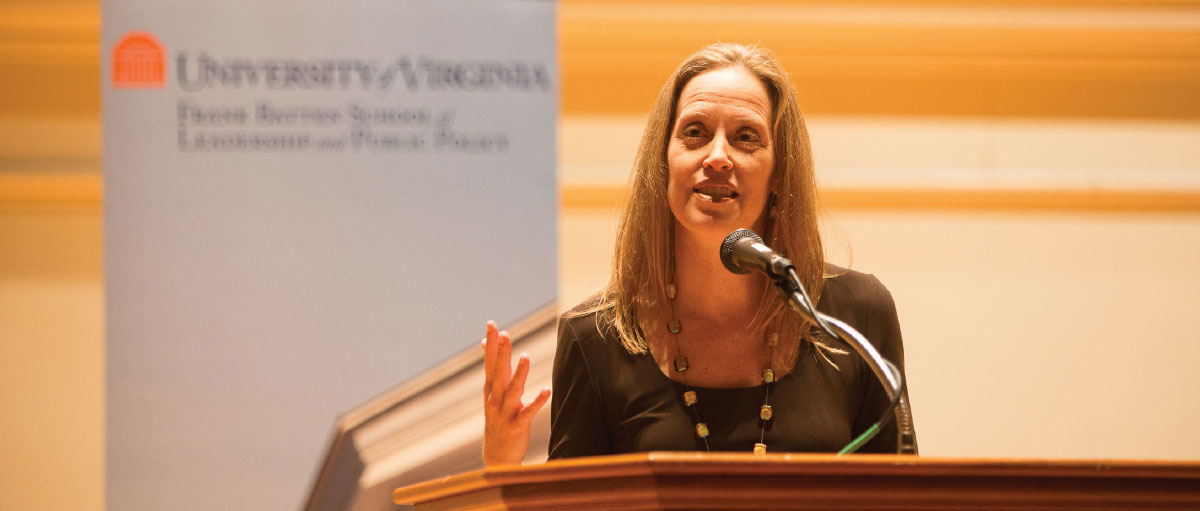THE RECIPIENT OF this year’s Thomas Jefferson Foundation Medal in Citizen Leadership was Wendy Kopp, founder of Teach For America, which has inspired more than 38,000 top recent college graduates and young professionals to join the movement to ensure educational opportunity for all. The Batten School plays a major role in selecting and hosting the Citizen Leadership medalist at U.Va.
The University and the Thomas Jefferson Foundation jointly presented the three Thomas Jefferson Medals in Architecture, Citizen Leadership, and Law at a luncheon in Garrett Hall on April 12—the 270th anniversary of Jefferson’s birth. Presenting the awards were U.Va. President Teresa Sullivan and Leslie Greene Bowman, president and CEO of the Thomas Jefferson Foundation, which is the independent, nonprofit organization that owns and operates Monticello. Kopp and the other award recipients also were honored at a dinner at Monticello.
Kopp founded Teach For America to close the educational opportunity gap, she told an audience of students, faculty and community members during her public address in Old Cabell Hall. She called on this generation to dedicate itself to a revolution in education.
Among children born into families with incomes in the lowest 20 percent, only 34 percent will attend college, compared to 80 percent of children from families in the highest quintile. Low-income areas send more boys to prison than to college. If such outcomes persist and aren’t addressed, Kopp insisted, “You realize we don’t have a chance to live up to our moral, civic and economic obligations.
Kopp founded Teach For America with a vision, she said, that “by asking people to commit two years to firsthand work in our highest-need classrooms, to go above and beyond traditional expectations and help address this injustice for the kids growing up today, that that experience would, in essence, radicalize them and would change everything about their career trajectories and priorities, and would ultimately shape a generation of leaders who are fundamentally committed to taking on this challenge.”
The vision seems to be working, as Kopp explained by sharing three of the biggest lessons of her career.
First, America’s educational inequality is a solvable problem, she said. Whole communities are making substantial progress in closing the achievement gap. In the New York City school system, with 1.1 million students and 80,000 teachers, the graduation rate for African-American and Latino students has risen by 20 points in less than a decade, and fourth-grader achievement is now a full school year ahead of where it was.
“All this shows that we can make an enormous difference against a problem that many people view as completely intractable,” she said. “Once you realize we can do this, you realize we have to do it.”
Second, strong leadership is always at the core of meaningful progress, she said—“a constellation of leaders who understand that very different outcomes are possible and act accordingly.”
Teach For America has played a significant role in developing that leadership, she added. Two-thirds of the program’s alumni never leave education. “Take away those, and you would take away a lot of the energy and leadership driving the change,” she said.
Program alumni lead about 40 percent of New Orleans schools and nearly all of the city’s after-school support programs and organizations. In the last six years, New Orleans schools have more than doubled the rate of students meeting state performance standards.
Third, the successes in New Orleans, New York and elsewhere provide lessons that can be transferred across the nation and even around the world, Kopp said, because so many places share the same fundamental problem: Children’s socioeconomic background predicts their educational outcomes.
In 2007, Kopp founded Teach For All, an international network of organizations similar to, or inspired by, Teach For America. Now there are schools in India, Israel, and rural Chile inspired by the “Knowledge Is Power Program,” or KIPP, a network of charter schools in America. Conversely, reforms and innovations from the far corners of the world will gradually make their way back here.
“Thomas Jefferson once said, ‘A little rebellion now and then is a good thing.’” Kopp said in closing. “Every generation has its rebellion, its revolution. I hope that this generation determines that education will be its revolution.”
MORE EVENTS
Class Speaker: Governor Robert McDonnell
Congressman Gerry Connolly on Public Policy Challenges
